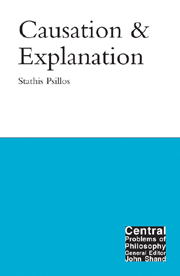1 - Hume on causation
from I - Causation
Summary
The regularity view of causation
A good starting point for our philosophical endeavours is David Hume's account of causation. His work on this subject has been, by far, the most important and influential ever. Hume's account has been taken to be a reductive one. It's been typical to call this account the Regularity View of Causation (RVC).
RVC
c causes e iff
(a) c is spatiotemporally contiguous to e;
(b) e succeeds c in time; and
(c) all events of type C (i.e., events that are like c) are regularly followed by (or are constantly conjoined with) events of type E (i.e. events like e).
So, on RVC, causation reduces to spatiotemporal contiguity, succession and constant conjunction (regularity). It reduces, that is, to non-causal facts. A corollary of RVC is that there is no necessity in causation: there is no necessary connection between the cause c and the effect e that goes beyond – or underpins – their regular association. RVC has been espoused by many eminent philosophers and has been taken to be the official Humean view. Here are a few representative statements of it.
The Law of Causation … is but the familiar truth that invariability of succession is found by observation to obtain between every fact in nature and some other fact which has preceded it …
(Mill 1911: 213)We must ask ourselves: when we assume causation, do we assume a specific relation, cause-and-effect, or do we merely assume invariable sequence?
- Type
- Chapter
- Information
- Causation and Explanation , pp. 19 - 56Publisher: Acumen PublishingPrint publication year: 2002

